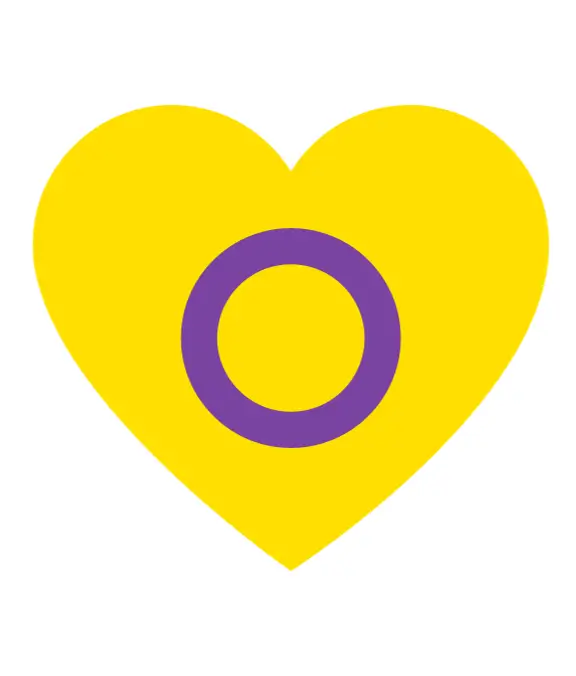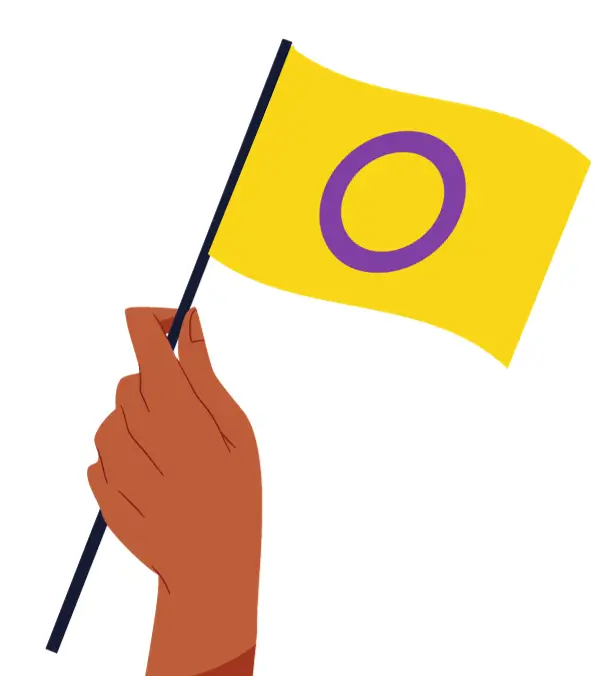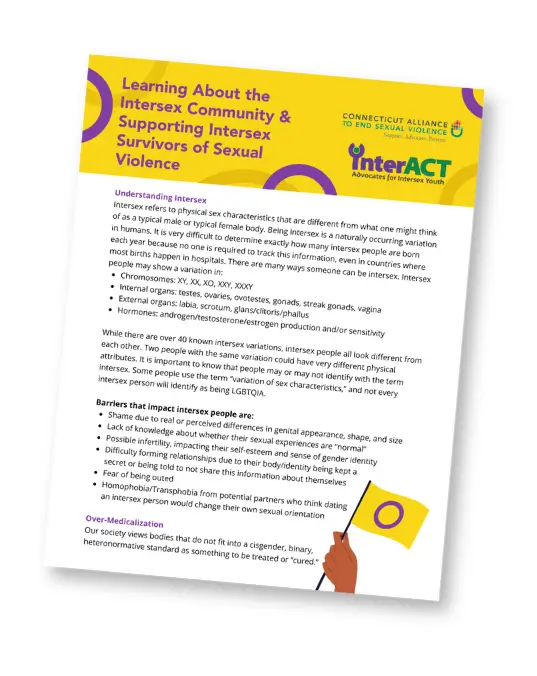
Understanding Intersex
Intersex refers to physical sex characteristics that are different from what one might think of as a typical male or typical female body. Being intersex is a naturally occurring variation in humans. It is very difficult to determine exactly how many intersex people are born each year because no one is required to track this information, even in countries where most births happen in hospitals. There are many ways someone can be intersex. Intersex people may show a variation in:
- Chromosomes: XY, XX, XO, XXY, XXXY
- Internal organs: testes, ovaries, ovotestes, gonads, streak gonads, vagina
- External organs: labia, scrotum, glans/clitoris/phallus
- Hormones: androgen/testosterone/estrogen production and/or sensitivity
While there are over 40 known intersex variations, intersex people all look different from each other. Two people with the same variation could have very different physical attributes. It is important to know that people may or may not identify with the term intersex. Some people use the term “variation of sex characteristics,” and not every intersex person will identify as being LGBTQIA.
Barriers that impact intersex people are:
- Shame due to real or perceived differences in genital appearance, shape, and size
- Lack of knowledge about whether their sexual experiences are “normal”
- Possible infertility, impacting their self-esteem and sense of gender identity
- Difficulty forming relationships due to their body/identity being kept a secret or being told to not share this information about themselves
- Fear of being outed
- Homophobia/Transphobia from potential partners who think dating an intersex person would change their own sexual orientation
Over-Medicalization
Our society views bodies that do not fit into a cisgender, binary, heteronormative standard as something to be treated or “cured.”
While there are some aspects of an intersex variation that might need medical intervention (e.g. the inability for urine or feces to leave the body), being intersex is not in and of itself a medical condition. Doctors are often in the practice of surgically and/or medically treating an individual to assign them a sex they believe the individual should be. This practice may teach intersex people and their caregivers that this part of their identity/body is wrong or an issue, which creates more isolation and stigma.
Many intersex individuals have repeated, invasive exams, treatments, and/or surgeries, often starting at a young age. The impacts of these occurrences could result in:
- Trauma and PTSD/C-PTSD
- Distrust of healthcare providers
- Need for lifelong hormone replacement therapy
- Physical scarring, loss of sexual sensation, sterilization, urinary incontinence, and change in libido
- Feeling dehumanized or looked at as a “case study”

Sexual Violence Against Intersex People
Although data are limited, one study of 1,587 intersex individuals revealed that intersex individuals who were open about their intersex identities experienced a higher rate of sexual and physical violence (25%) than intersex individuals who were not open about being intersex (20%). In addition to the dynamics of sexual violence you may be familiar with, intersex people may experience the following forms of sexual violence:
- Pressure to participate in sexual activity that conforms to specific gender stereotypes
- Accusations that they “tricked” their partner about their body or sex
- Threats to expose their identity/body as a means of power and control
- Pressure to take medications or have surgeries to change their body to conform to a specific set of sexual characteristics
Medicalized Rape
Intersex people may view their experiences with the healthcare system as medicalized rape. There are multiple reasons for this:
- Intersex people may receive repeated, invasive, unnecessary exams.
- Exams may be viewed as teaching opportunities for healthcare professionals.
This may feel especially dehumanizing and violating to an intersex child, whose caregivers give consent on their behalf. - Intersex people may be asked to provide aftercare to their own genitals following medical treatment(s), which may cause pain and confusion.
Intersex children’s caregivers may be responsible for providing aftercare following medical or surgical treatment(s), which can seem sexual in nature and/or cause pain and confusion.

Supporting Intersex Victims/Survivors of Sexual Violence
There are many factors that create barriers for intersex survivors of sexual violence seeking support, including access to healthcare, trauma around family/relationships, social stigma, and lack of adequate sexual health inform support.
Best Practices for Sexual Assault Advocates
- Remember that not all intersex stories or people are the same.
- Mirror the language your client uses when discussing their identity, experiences, and body.
- Ask your client what they need, listen to their answer, and believe them.
- Do not ask unnecessary questions about their identity/body. Ensure any questions you ask an intersex client are related to the services you are providing.
- Always ask for consent before speaking and advocating on behalf of your client.
- Educate yourself on the intersex community and resources, then share that information with others.
- If you notice other service providers, including medical staff or police, asking unrelated questions or being invalidating or unsupportive to your client, step in and advocate for your client. Consider having conversations with these service providers at a later time to educate them further.
Considerations for Sexual Assault Medical / Forensic Exam
The client may be resistant to having a sexual assault medical/forensic exam due to past medical trauma. Remember to inform the client that they can skip any part of the exam. The questions below may help start a conversation before a forensic exam:
- Are there any medical conditions we should know about?
- Do you have any history with medical trauma?
- Are there any specific ways that I can advocate for you with medical staff?
Resources
interACT: Advocates for Intersex Youth
Intersex Youth Advocacy Organization. Includes political strategy campaigns and resources for medical providers, friends, family, and other community members.
Intersex Justice Project
Intersex People of Color led activist organization and organizers of the End Intersex Surgery Campaign.
InterConnect
Support group for youth, adults, and families of people with AIS or other intersex variations.
Providing Ethical and Compassionate Health Care to Intersex Patients
Intersex-Affirming Hospital Policies
Written By: interACT: Advocates for Intersex Youth & Lamda Legal
Affirming Primary Care for Intersex People
Written by: National LGBTQIA+ Health Education Center
Listening to Intersex Voices
The Interface Project (Video series sharing lived experiences of intersex people.)
Hans Lindahl (Intersex Organizer & Media Educator)
Alicia Roth Weigel (Intersex Activist & Writer)
References
- European Union Agency for Fundamental Rights (FRA). (2020). The EU LGBTI II: A Long Way to Go for LGBTQI Equity.
- WomensLaw.org. (2018). What forms of abuse are unique to intersex victims?
Additional information from: Khanna, Niki (2023, Aug.). Understanding Intersex and Helping Intersex Survivors [Virtual presentation for the Connecticut Alliance to End Sexual Violence].
The Alliance would like to share their gratitude to Niki Khanna, LMFT, and interACT: Advocates for Intersex Youth for their expertise and collaboration in creating this resource and providing education to our coalition to better serve intersex survivors of sexual violence.

